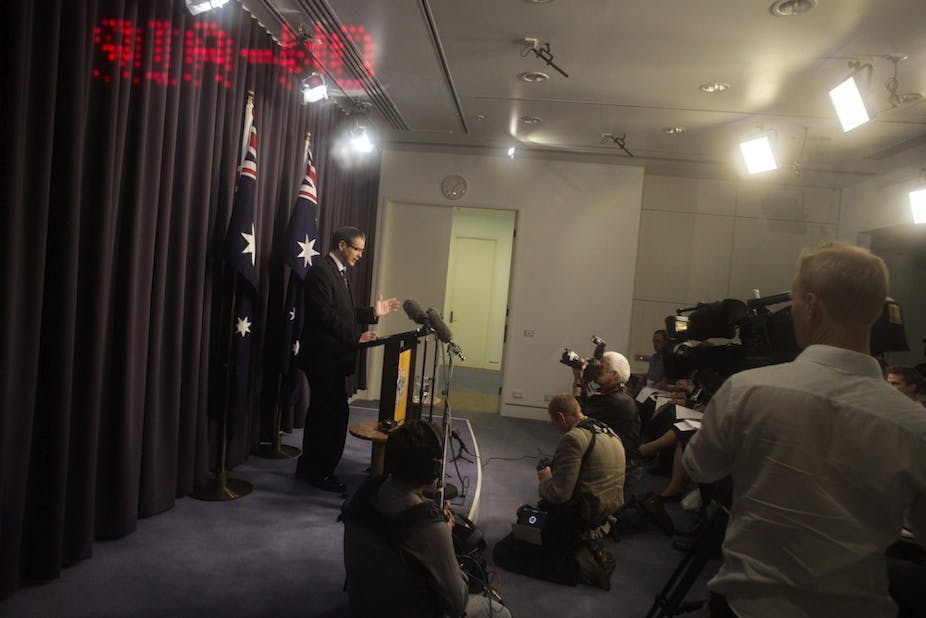Communications Minister Stephen Conroy has indicated the federal government will not be introducing a “privacy tort” in the near future.
Instead, it will refer questions about the tort back to the Australian Law Reform Commission (ALRC), a reference that probably means we will not see the tort for at least ten years.
Why do we care? Tort law serves to encourage responsibility and compensate people for injury. It’s an unremarkable feature of the Australian legal system, one that we often take for granted and that overall has distinct advantages.
The Australian Law Reform Commission in 2008 recommended that there should be a tort regarding serious invasion of privacy. The NSW Law Reform Commission had made a similar recommendation. So had the Victorian Law Reform Commission. So had a range of lawyers, civil society advocates and leading bodies such as the Australian Privacy Foundation.
The recommendation reflected a recognition that the protection of privacy in Australian law is inadequate. If your privacy is invaded by nosey neighbours, former partners, corporations or government agencies, do not expect compensation. Do not expect much protection, given the threadbare Commonwealth, state and territory statutes dealing with surveillance in the workplace and other locations.
That absence is surprising, given Australia’s commitment to human rights agreements that enshrine privacy as a key facet of the dignity and autonomy that underlies all Australian law. It’s also surprising given that we have seen major abuses by media organisations and marketers, who claim that self-regulation is effective and essential.
In 2011 the Government announced that introduction of a privacy tort would be considered. The tort would enable compensation for injury. It would discourage misbehaviour through civil and criminal sanctions. It would not inhibit legitimate activity by the police, national security personnel, marketers and journalists. It would address concerns expressed by a wide range of Australians. It would be consistent with human rights obligations under domestic and international law.
A subsequent discussion paper, which was not strongly promoted, provided a broad outline of issues. The paper offered a proposal for national legislation, which would be interpreted by the courts and would not involve a new privacy watchdog. Law currently features the Australian Privacy Commissioner, regrettably a watchdog that has few teeth and more importantly is very reluctant to come out of its kennel.
One journalist damned the proposal as sinister. Others claimed it was meant to intimidate the media or referred to a conspiracy. That condemnation is implausible because the Government doesn’t seem to have what’s needed for conspiracies and because the tort would strengthen rather than destroy credible journalism.
Other critics were equally emotive, claiming that the tort was not needed or that it would result in uncertainty and undesirable litigation. (Notions of what is undesirable may of course be affected by the arrest of UK colleagues after egregious disregard of the privacy of notables – people whom Rupert Murdoch described as scumbag celebrities – and victims of personal tragedies).
Anxieties about the tort’s impact are uninformed or disingenuous. In a conference paper last year I reminded the audience that we have a model for judicial handling of questions about public and private interest. That model is working well. It is confidentiality law, relied on by businesses, by individuals and journalists.
There is no reason to believe that Australian courts couldn’t handle the privacy tort in the same way. It wouldn’t be the end of the world, unleash tsunamis of frivolous litigation or stifle free speech.
The Cabinet appears to have sat on the proposal, scared of the wrath of media proprietors and journalists such as Andrew Bolt and Alan Jones. With bad news in the polls and a focus on whether the PM will get rolled by her colleagues it’s had an attack of the jellybacks. (Paul Keating memorably used this phrase to describe to opponents showing an unwillingness to shoulder responsibility and make tough decisions.)
Flipping questions about the tort back to the ALRC is escapist. The ALRC’s resources have been cut by Coalition and ALP governments over the past 15 years. It is busy with major reports on for example copyright reform. It has already provided cogent analysis of the need for the tort and taken on board community feedback.
Asking the ALRC to have another look simply defers a decision into 2014 and beyond. Deferral is an exercise in minimising political embarrassment. It is contrary to the Government’s supposed commitment to managerial excellence and human rights. It signals politicians think re-election (and media groups) are more important than the dignity of all Australians. Polls matter more than principles.

